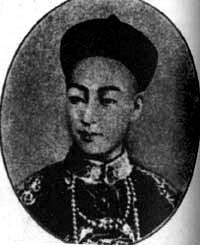CIIC:Selected anniversaries/November 14
1860: China-Russia Treaty of Peking was signed. On November 14, 1860, Qing Dynasty imperial commissioner Yixin and Russian envoy Nikolai Ignatyev signed the Treaty of Peking. The treaty contained 15 articles. Its main contents were as follows: First, to confirm the Treaty of Aigun (1858); second, the originally jointly-administrated boundary territory covering some 400,000 sq. km, east to the Ussuri River, including Sakhalin Island, was to be transferred to Russia; and third, the original Chinese internal lake Zaysan and Te Muer were to be set as the Sino-Russian western border. In this way, Russian occupied a bulk of land in the east over Lake Balkhash and also furnished a theoretical basis for the further misappropriation of the eastern and southern part of the lake. By the Second Opium War, the Russians had looted more than 1 million sq. km of Chinese territory.
1908: The Emperor Guangxu passed away. Emperor Guangxu, born Zaitian of Aisin Gioro, was born in 1871. Zaitian was the son of Yixuan, also known as 1st Prince Chun. Since Emperor Tongzhi died without a son, Zaitian was suggested to become the reigning monarch (1875-1908). Enthroned when he was only four years old, Guangxu did not begin to participate in state affairs until 1889, when he was 16. But even after Guangxu began formal rule at 18, Empress Dowager Cixi continued to influence his decisions and actions.
In 1814, Japan launched a war of aggression against China, which ended with the Treaty of Maguan. After an embarrassing defeat, with the help of more progressive Qing mandarins like Kang Youwei, Guangxu issued edicts for a massive number of far-reaching modernization reforms.
The reforms, however, were too sudden for China, still under neo-Confucian influence, and Cixi became displeased, as they served as a serious check on her power. Thus, it led her to resume the role of regent and once again take control of the country. Cixi engineered a coup d'état, forcing the young, reform-minded Guangxu into seclusion. Guangxu was put under house arrest and died at the age of 38 on November 14, 1908, just a day before Empress Dowager Cixi herself passed away.
The greatest deed in Emperor Guangxu's life was his "Hundred Days Reform." Emperor Guangxu was the first Chinese leader to implement policies of modernization and capitalism. Though it was ultimately a failure, it marked the only time in modern Chinese history that a nationwide bourgeois reform movement was launched from top to bottom. Since the Opium War, within the Qing emperors, only Guangxu recognized the inadequateness of traditional politics and culture. He realized that Western politics and culture, for all its faults, still had strengths, and the way to salvation was not only in the introduction of Western science, but also through implementation of a New Deal.
1989: The Beijing Legend Computer Group (now called Lenovo) was established with commitment to promote and develop computer products.
1998: At a meeting of the Standing Committee of the 9th National People’s Congress, the Organic Law on Villagers Committees was passed, which laid out a clear stipulation for the direct election of village officials.
